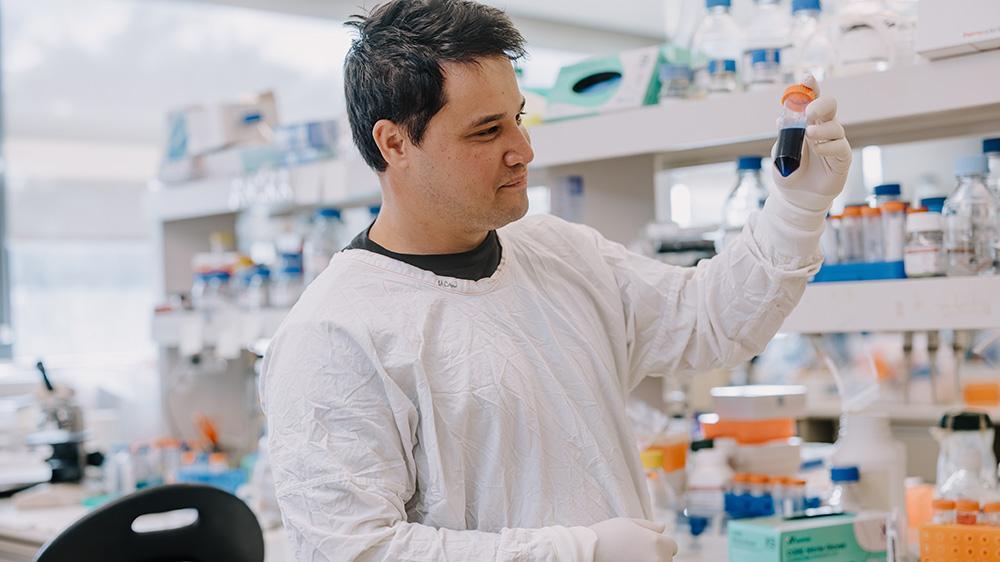Researchers build on work of renowned academic Professor Justin Yerbury
A team of researchers from the University of Wollongong (UOW) have discovered that a unique trio of medications could hold the key to improved treatment outcomes for hereditary cases of Motor Neurone Disease (MND) caused by mutations in the SOD1 protein.
The groundbreakings findings are detailed in a new paper, 'A polytherapy approach demonstrates therapeutic efficacy for the treatment of SOD1 associated amyotrophic lateral sclerosis', published in eBioMedicine.
Building on the work of the late Professor Justin Yerbury, who passed away from MND in 2023, his research team found that a combination of three drugs could be used to target the SOD1 protein, which has been linked to the development of MND.
The project was funded in 2020 by a FightMND $1 million Drug Development Grant awarded to Professor Yerbury, who was a carrier of the SOD1 gene.
Most cases of MND are sporadic, meaning they are not inherited, but approximately 5 to 10 per cent are caused by a genetic mutation. SOD1, also known as superoxide dismutase 1, is an antioxidant enzyme that plays a crucial role in protecting cells from damage caused by superoxide radicals. About 35 per cent of people with inherited MND in Australia have mutations in the SOD1 gene.
Dr Jeremy Lum, lead investigator on the project and Bill Gole Postdoctoral Research Fellow in Molecular Horizons and the School of Medical, Indigenous and Health Sciences at UOW, said the team used a novel approach by not only testing one drug, but a combination of drugs. The aim was to repair damaged SOD1 protein, prevent harmful SOD1 clumps from forming, and protect dying motor neurons.
"We had been trialing different approaches with the drugs, but what we found was that a combination of all three, at a lower dose, was the most promising in producing better outcomes for MND. In mice, the drugs reduced the progression of MND, increased their survival rates, diminished levels of the unstable SOD1 protein and protected the motor neurons," Dr Lum said.
 Dr Jeremy Lum, lead investigator on the project, said the team used a novel approach by not only testing one drug, but a combination of drugs.
Dr Jeremy Lum, lead investigator on the project, said the team used a novel approach by not only testing one drug, but a combination of drugs.
There are 150 different mutations in the SOD1 gene associated with MND and all change the structure and stability of the SOD1 protein.
In motor neurons, such structural changes cause SOD1 protein to clump together, prevent harmful substances from being removed, and compromise the supply of energy to the cell, all of which are triggers for their death.
Dr Lum said the team had expanded upon the previous research of Professor Yerbury, who was focused on exploring the role of SOD1 mutations in the development and acceleration of MND.
"SOD1 was a huge focus of Justin's work, which showed that mutations in the protein cause it to become unstable, forming large clumps that are toxic to motor neurons. Justin had been looking at understanding how SOD1 folds for several years, with the hope of slowing the progression of MND," Dr Lum said.
"We wanted to continue this work and uncover which combination of drugs can stabilise the SOD1 protein in cells. But we also were driven by the question of, how can we stop the protein from misfolding and clumping to begin with?"
Professor Yerbury was a carrier of the SOD1 mutation. His work to understand the gene mutation, and its connection to MND, became the foundation of much of his research.
Genetic MND means there is more than one person in a family affected by the disease. Professor Yerbury lost many family members to MND over the course of decades, including his mother, grandmother, and aunt.
The research was conducted by Dr Lum, Mikayla Brown, Natalie Farrawell, Dr Rachael Bartlett, Dr Christen Chisholm, Dr Jody Gorman, Professor Heath Ecroyd, Dr Luke McAlary, and Professor Yerbury from the Yerbury Lab in UOW's Molecular Horizons, Professor Anthony Dosseto and Dr Florian Dux from UOW's School of Science, Associate Professor Peter Crouch, Professor Paul Donnelly and Lachlan McInnes from the University of Melbourne.
Dr Lum said the team were proud to build on the foundations and carry out the visions of Professor Yerbury's work and to continue their vital and groundbreaking research into MND.
"MND is a complex disease, and we believe that tackling it from multiple angles, with a combination of drugs targeting various aspects of its biology, holds greater promise than relying on a single treatment," he said.
"The researchers in the Yerbury Lab remain incredibly passionate about improving outcomes for MND, which is such a cruel, complex, and unforgiving disease. It is inspiring to build upon the foundation laid by Justin, who was a mentor to us all. His years of relentless effort have brought us to this moment."
About the research
'A polytherapy approach demonstrates therapeutic efficacy for the treatment of SOD1 associated amyotrophic lateral sclerosis', by Jeremy Lum, Mikayla Brown, Natalie Farrawell,Rachael Bartlett, Christen Chisholm, Jody Gorman, Heath Ecroyd, Luke McAlary, Justin Yerbury, Anthony Dosseto, Florian Dux, Peter Crouch, Paul Donnelly, and Lachlan McInnes, was published in eBioMedicine: https://www.sciencedirect.com/science/article/pii/S2352396425001367






